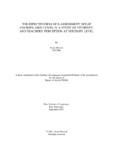The effectiveness of e-assessment of EAP courses amid covid-19: a study of students’ and teachers’ perception at tertiary level
Abstract
Conducting online courses is a common phenomenon in the developed countries. It is not a common practice in a developing country like Bangladesh. However, due to COVID-19 pandemic, government of Bangladesh had to shut down all the educational institutions. Thus, teachers had to bring a dramatic transmission and within a short amount of time shifted from offline to online classes. But the researchers and scholars all over the country raise questions regarding the effectiveness of e-assessment as assessments are required to portray the actual scenario of students’ learning. The current study aims to find out to what extent the e-assessments are effective. To facilitate, 30 students and 4 teachers from 4 privately-run universities of Dhaka virtually participated in this study. Teachers’ responses are analyzed in light of Krashen’s Comprehensible Input Hypothesis (i+1) and Vygotsky’s concept of Zone of Proximal Development (ZPD).The findings show that although teachers can ensure one of the characteristics of good assessment, validity, the remaining ones reliability and practicality are difficult to incorporate due to the presence of the limitations such as e-cheating and technical glitches. In contrast, teachers find e-assessment as an advantage in terms of exchanging feedback.
Description
This thesis is submitted in partial fulfillment of the requirements for the degree of Masters of Arts in Teaching to Speakers of Other Languages, 2021.Department
Brac Institutes of LanguagesType
ThesisCollections
- Thesis (M.A in TESOL) [113]

